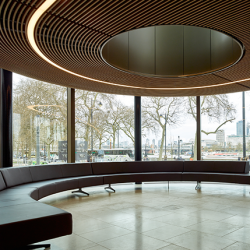November 10, 2017
Best practice in flexible working and gender diversity honoured at awards presentation
Workingmums.co.uk has announced the winners of its eighth annual Top Employer Awards, celebrating the leading companies in gender diversity and flexible working. The Awards were presented at a ceremony at London’s Soho Hotel on 7th November where the keynote speaker was Ann Francke, CEO of the Chartered Management Institute. Winner of the Overall Top Employer Award was Lloyds Banking Group. The judges felt it was ‘a beacon for other employers with regard to its agile hiring programme which was a root and branch attempt to normalise different ways of working from recruitment onwards. It was a strong performer across all the categories and had made a major step forward in embedding a flexible culture.’






 The future workplace will replace familiar, rigid hierarchies and departments with small, collaborative networks of teams and the lines between individual organisations and ecosystems will blur as companies increasingly cast their net wider to innovate. This is one of the predictions made in a Fujitsu-commissioned whitepaper ‘
The future workplace will replace familiar, rigid hierarchies and departments with small, collaborative networks of teams and the lines between individual organisations and ecosystems will blur as companies increasingly cast their net wider to innovate. This is one of the predictions made in a Fujitsu-commissioned whitepaper ‘
 British workers are lagging behind employees from other countries when it comes to flexible working hours and benefits like extended leave, suggests new research. New independent research commissioned by travel specialists Opodo.co.uk compared Britain with other nations across Europe and the USA, which reveals that British companies are lagging behind other businesses when it comes to flexible working. Three-quarters of employees in the UK (75 percent) don’t believe they have a generous holiday allowance and 84 percent aren’t offered time back in lieu for days worked over the weekend. It’s of no surprise then that 69 percent of Brits don’t think they have a good work-life balance.
British workers are lagging behind employees from other countries when it comes to flexible working hours and benefits like extended leave, suggests new research. New independent research commissioned by travel specialists Opodo.co.uk compared Britain with other nations across Europe and the USA, which reveals that British companies are lagging behind other businesses when it comes to flexible working. Three-quarters of employees in the UK (75 percent) don’t believe they have a generous holiday allowance and 84 percent aren’t offered time back in lieu for days worked over the weekend. It’s of no surprise then that 69 percent of Brits don’t think they have a good work-life balance.








 Cyber risk is becoming increasingly common while the types of breaches are becoming more diverse, claims a new white paper by the audit and accounting expert BDO. For instance, ransomware is now the fifth most common type of malware; with the cost of freeing up computer systems from ransomware tripling since 2016. Yet organisations are continuing to spend up to four times more on insuring other company assets (e.g. property, equipment etc.) than on cyber insurance, despite an increasingly widespread belief that their cyber assets are in fact up to 14 percent more valuable. The report also finds that as cyber incidents increase, they become more difficult – and therefore more expensive – to defend. In the new cyber insurance white paper, BDO’s global cybersecurity leadership group stresses the importance of businesses gaining an understanding of their unique risk profiles in order to ensure the right cyber insurance for their needs. Cyber insurance: managing the risk does include some of the positive trends around cyber security – for example, both the level of Board involvement and investments in cybersecurity have increased significantly in the last 2-3 years.
Cyber risk is becoming increasingly common while the types of breaches are becoming more diverse, claims a new white paper by the audit and accounting expert BDO. For instance, ransomware is now the fifth most common type of malware; with the cost of freeing up computer systems from ransomware tripling since 2016. Yet organisations are continuing to spend up to four times more on insuring other company assets (e.g. property, equipment etc.) than on cyber insurance, despite an increasingly widespread belief that their cyber assets are in fact up to 14 percent more valuable. The report also finds that as cyber incidents increase, they become more difficult – and therefore more expensive – to defend. In the new cyber insurance white paper, BDO’s global cybersecurity leadership group stresses the importance of businesses gaining an understanding of their unique risk profiles in order to ensure the right cyber insurance for their needs. Cyber insurance: managing the risk does include some of the positive trends around cyber security – for example, both the level of Board involvement and investments in cybersecurity have increased significantly in the last 2-3 years.







December 19, 2017
We need to have an honest conversation about presenteeism
by Steve Brewer • Comment, Flexible working, Workplace design
We have talked before about the risks of over thinking problems. It is not just something that consultants, designers and the workplace intelligentsia are guilty of – everyone does it. It is why we do not switch off when we are ill and still insist on going to work. We over think the consequences of not being in our workplace. Likewise, many traditional line managers simply cannot get their head around their teams working from home. After all, modern management mantras all talk about creating a great atmosphere in which teams all work together – in the same space at the same time? We all tend to over complicate most things and that is one of the main reasons in the UK we struggle with the concept of working from home. A consequence of this is the rise in presenteeism, which is mainly linked to illness, people ignoring how bad they feel and because of a perceived pressure, still turning up for work.
(more…)